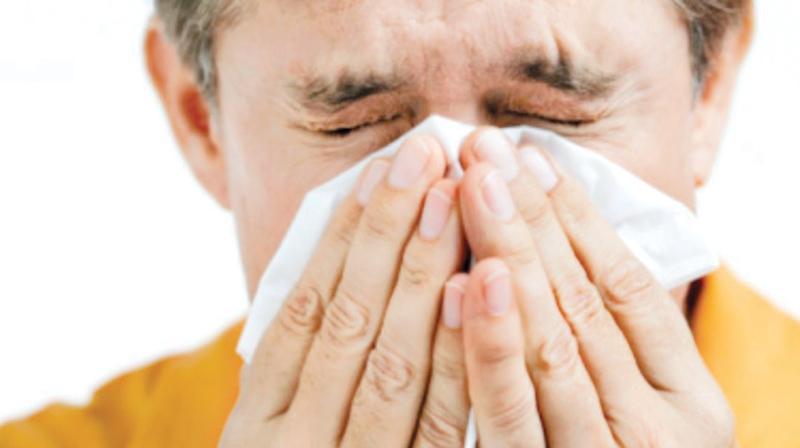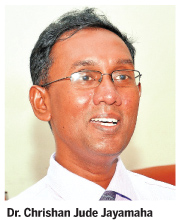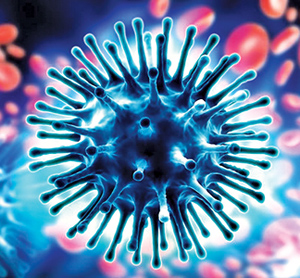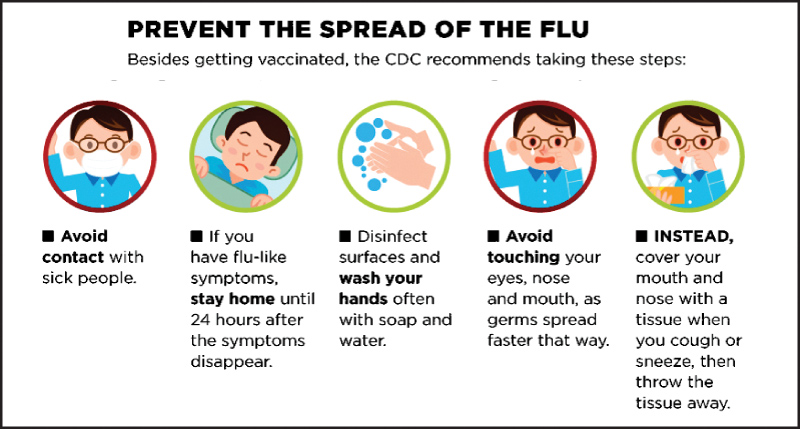
The number of persons with colds, coughs, fever, and breathing problems, is currently on the rise. While health officials have reassured there is no need to panic, as this was just another seasonal Influenza peak due to monsoonal rains, they have urged the public to take precautions to prevent being infected by this highly contagious virus. The Health Ministry has issued simple, easy to follow guidelines which even schoolchildren can follow. Adherence to strict personal hygiene, washing of hands regularly, staying at home when you feel unwell so that you won’t infect others, bed rest, plenty of liquids to prevent dehydration, and avoiding crowded places are among the rules they have issued according to the recommendations of the World Health Organisation ( WHO).
 Health authorities have also warned, while symptoms are self limiting and morbidity varies from mild to severe, it could also lead to more serious complications even ending with death, in the case of the very young, elderly, pregnant women as well as those with already compromised immune systems due to chronic pre-existing conditions like diabetes, heart, liver and kidney diseases.
Health authorities have also warned, while symptoms are self limiting and morbidity varies from mild to severe, it could also lead to more serious complications even ending with death, in the case of the very young, elderly, pregnant women as well as those with already compromised immune systems due to chronic pre-existing conditions like diabetes, heart, liver and kidney diseases.
They have also warned patients to abstain from taking aspirin and recommended that any fever should be treated at home with time tested herbal drinks such as, coriander and water.
The Sunday Observer spoke to Community Physician and Consultant Virologist, and Head, Medical Research Institute, Dr Chrishan Jude Jayamaha to find out more about seasonal flu in general, the current type now prevalent and how it could be prevented and treated.
Excerpts…
Q. In the last few years Sri Lanka has experienced seasonal influenza viruses circulating in humans.. What are they? How are they categorized?
A. There are 3 types of influenza viruses – A, B and C. Type A influenza viruses are further classified into subtypes according to the combinations of various virus surface proteins. Among many subtypes of influenza A viruses, influenza A(H1N1) and A(H3N2) subtypes currently circulate among humans. Influenza viruses circulate in all parts of the world. Influenza A and B have been co-circulating in Sri Lanka for the past 10 years each taking turns for dominance. When one gets dominance, the other influenza type takes a backseat.
Q. What are the viruses that are currently circulating? Of them which is the most predominant?
A. At present, Influenza B and influenza A H3N2 co-circulate. Influenza B shows slight dominance.
 Q. How are they differentiated from each other in your lab at the MRI?
Q. How are they differentiated from each other in your lab at the MRI?
A. By a state-of-the-art molecular biology test called, realtime PCR which cost about Rs 10,500/-
Q. At what time of the year are the usual outbreaks? Why?
A. Sri Lanka experiences two seasons/peaks. One greater peak from Nov/Dec- Jan/Feb and the other lesser peak from April/May to June/July. Each peak coincides with monsoon rains.
Q. When do you expect it to peak again?
A. The next viral flu peak is expected from May-June.
Q. How are influenza viruses transmitted?
A. When an infected person coughs, infected droplets get into the air and another person can breathe them in and be exposed. The virus can also be spread by hands contaminated with influenza viruses.
Q. Can animals or birds transmit them as well?
A. They have their own influenza viruses (avian flu, swine flu etc). Very rarely these strains can be transmitted to humans after a prolong direct contact.
Q. What are the symptoms of influenza and an ordinary flu? Are they the same?
A. Yes. Both have the same symptoms which I have mentioned earlier.
Q. What are the health impacts? Can it cause haemorrhage ?
A. There is no haemorrhage in influenza. But, morbidity is the problem. Patients admitted with pneumonia may need special care in intensive units.
Q. Who are those most at risk? Very young? Very old?
 Blood tests |
A. Yearly, influenza epidemics can seriously affect all populations, but the highest risk of complications occur among children younger than 2 years, adults aged 65 or older, pregnant women, and people of any age with certain medical conditions, such as, chronic heart, lung, kidney, liver, blood or metabolic diseases (such as diabetes), or weakened immune systems.
Q. Are there other risk factors such as, chronic illnesses and compromised immune systems?
A. Yes. As I said earlier, chronic heart, lung , kidney , liver , blood or metabolic illnesses like diabetes or weakened immune systems can put people at high risk of getting complications from viral flu.
Q. Do these viruses mutate? Or do they remain the same? If so, for how long a period?
A. It is an inherent nature of the influenza virus to change (mutate).
When this happens in a major way it causes a global pandemic (which is not common) spreading it on a worldwide scale.
Q. If the viruses are continuously evolving, does it mean a person can get infected multiple times throughout their lives?
A. Yes, there is no long lasting immunity unlike in certain virus infections like chickenpox or measles.
Q. Is it the same virus that infects them repeatedly or another virus of the same group?
A. The same virus subtype can infect the same person after sometime.
A different subtype (say H1N1) can also infect a person who was infected by a different subtype (e.g. H3N2)
Q Does it also pose a similar danger?
A. Unlike dengue, there is no immune enhancing mechanism in influenza when a person is infected with a different subtype.
Q. I understand that Influenza A virus subtypes H1N1 and H3N2 have been in circulation causing influenza recently. In addition, 2 types B virus are also circulating . Are these viruses as severe as the type now circulating?
A. All of them are not severe, but can cause complications.
Q. What are the main complications of influenza ? Pneumonia? Respiratory infections? Breathing difficulties?
A. As stated earlier, breathing difficulties, pneumonia , and respiratory infections are caused by one’s own bacteria flora (secondary bacterial infection in respiratory tract.
Q. When is it necessary to see a doctor?
A. When you have breathing difficulties, feel faintness, or have high fever, and if you have pre-existing risk factors that would have compromised your immune system.
Q. Can influenza be treated at home? If so, what are the home remedies?
A. One can treat influenza at home by adhering to some simple rules. Take adequate rest and plenty of water. Do not take aspirin or NSAID (diclofenac sodium, brufen etc) or pain killers.
Follow personal hygienic practices and wash hands frequently, cover mouth when sneezing so you won’t infect others in the home.
Q. When is hospitalization advised?
A. When you feel faintness and have difficulty in breathing,
Q. What is the treatment procedure?
A. Mainly, taking adequate rest with plenty of water, if you are being treated at home .
However, for patients admitted to hospital, there are specific antivirals available to treat them.
Q. How long does recovery take? Does it depend on the individual?
A. Most of the time it is a self-limiting illness. Usually, full recovery is within 3-6 days. But, immune-compromised individuals might take a longer time.
Q. Does it vary in different age groups?
A. Children less than 2 years and elderly people would take a longer time to recover.
Q .All this time we talked about treating the infection. Tell us how you can Prevent it. Are there simple rules we can follow?
A. To prevent transmission, people should cover the mouth and nose with a tissue when coughing.
Discard tissues used safely so that they can’t contaminate or spread the infection.
Wash hands regularly. Adhere to general personal hygiene . Stay at home if you are unwell.
Avoid unnecessary contact with large crowds in shopping malls, and other community gatherings where transmission of the infection is high from close contact with infected persons.
Q Is there a vaccine against seasonal influenza? I understand, the Drug Regulatory Authority of Sri Lanka has given the licence to use seasonal influenza ( flu) vaccines as in other countries?
A. Yes, there is a vaccine available in Sri Lanka which covers the strains Influenza A and B. Vaccination is especially important for people at higher risk of serious influenza complications.
Q Considering the possibility of a possible outbreak from this month due to the rains, what steps have been initiated by the Health Ministry to prevent such an occurrence?
A. We do NOT expect a possible outbreak of the disease .
According to our predictions, following the pattern of the disease, it will be the usual seasonal peak this year.
However, proper precautions must be taken not to expose, especially, young children, elderly persons and pregnant women as well as those with compromised immune systems by the public.

How to protect yourself from influenza
Besides getting vaccinated , The Centre for Disease Control , (CDC) USA,
recommends 5 steps to avoid flu spread.
Avoid contact with sick persons
If you have flu like symptoms, stay home until 24 hours after the symptoms
disappear.
Disinfect surfaces that are contaminated and wash hands often with soap and water.
Avoid touching your eyes, nose, as germs spread faster via droplets from these
openings
Instead, cover your mouth and nose with a clean tissue when you cough or sneeze.
Then dispose them safely.
Sri Lanka Epidemiology Unit on symptoms and prevention of Influenza illness resulting:
Influenza is an acute flu like illness resulting from infection by an influenza virus.
It is characterized by fever, cough, running nose, headache, muscle pain, diarrohea,
vomiting.
There are influenza virus types- A,B, C
Current virus circulating is Influenza B
A self limiting disease in a majority and full recovery in most
Can however cause complications in high risk individuals
Mode of Transmission
Spreads from human to human and not from animals. Confirmed, Bird flu never
reported in Sri Lanka
Direct contact with infected individual
Contact with contaminated objects ( called formites) such as toys and door knobs
By inhaling virus laden aerosols
High risk groups
Children below 2 years
Those above 65 years
